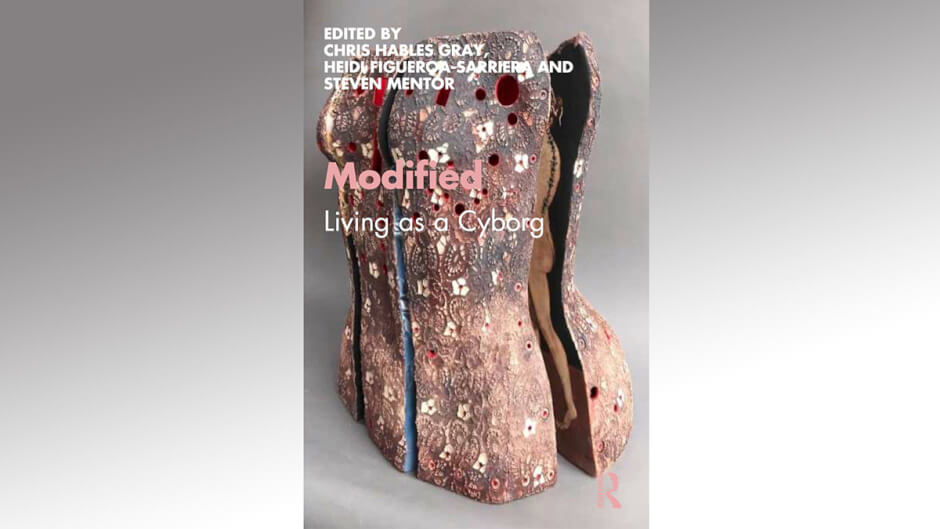Assistant Professor Angeliki Malakasioti and Honorary Doctorate Stelarc participate in the collective work “Modified: Living as a Cyborg”, Chris Hables Gray, Heidi Figueroa-Sarriera, Steven Mentor (eds.), Routledge, 2020, with artwork presentation and book chapters: “Seven Ghosts: Critical Confessions of a Psyborg Mind” (by Angeliki Malakasioti) and “Zombies, Cyborgs and Chimeras: Alternate Anatomical Architectures” (by Stelarc).
Publisher: Routledge; 1st edition (October 8, 2020) / ISBN-10: 0815364008 / ISBN-13: 978-0815364009
Pages: 296
(From the book description)
Building off the highly successful The Cyborg Handbook, this new collection of essays, interviews, and creative pieces brings together a set of compelling personal accounts about what it means to live as a cyborg in the twenty-first century.
Human integration with complex technologies goes back to clothes, cooking, and language, but has accelerated incredibly in the last few centuries, with interest spreading among scientists, coders, people with sophisticated implants, theorists, and artists. This collection includes some of the most articulate of these voices from over 25 countries, including Donna Haraway, Stelarc, Natasha Vita-More, Steve Mann, Amber Case, Michael Chorost, Moon Ribas, Kevin Warwick, Sandy Stone, Dion Farquhar, Angeliki Malakasioti, Elif Ayiter, Heesang Lee, Angel Gordo, and others. Addressing topics including race, gender, sexuality, class, conflict, capitalism, climate change, disability and beyond, this collection also explores the differences between robots, androids, cyborgs, hybrids, post-, trans- and techno-humans, offering readers a critical vocabulary for understanding and discussing the cyborgification of culture and everyday life.
Compelling, interdisciplinary, and international, the book is a perfect primer for students, researchers and teachers of cyberculture, media and cultural theory, and science fiction studies, as well as anyone interested in the intersections between human and machine.
Seven Ghosts
Critical Confessions of a Psyborg Mind
by Angeliki Malakasioti
Chapter 16 | 9 pages | ABSTRACT
Ambitious, thus psychogenic by its nature, the psyborgian entity is defined by a mysterious ectoplasmatic presence, accompanied by a dissociative fugue of consciousness, never anchoring at a fixed point, but constantly shifting and re-uttering its orientation. The psyborg self performs a process of online breathing inhaling and exhaling code or an enthusiastic gasp of digitality 'currents', aspiring to materialize or even sensationalize that which is in fact an immateriality. The psyborg self is broadcasting as an ever-present deus ex machina voice which keeps one in a constant state of distraction. The symptomatology of contemporary digital culture is inscribed on the landscape of the psyborg self, who refutes any pathology, nonetheless hosts one and only 'pathos': that of its ephemeral nature. But 'pathos' this time is not about the comprehension of its nostalgic transience but rather a primordial rendition of the word: the excitement and the momentum inherent in such a vigorous and rapidly evolving digital entity.
Zombies, Cyborgs and Chimeras
Alternate Anatomical Architectures
by Stelarc
Chapter 24 | 15 pages | ABSTRACT
A Zombie is a body that performs involuntarily, which does not have a mind of its own. A Cyborg is a human-machine system that becomes increasingly automated. There has always been a fear of the involuntary and an anxiety of the automated. To be an intelligent agent, one has to be both adequately embodied and intimately embedded in the world. The Chimera is the body that performs with mixed realities. A biological body, augmented with technology and managing data streams in virtual systems. But the body itself is now becoming a mobile, monitoring and transmission system that can be logged into and accessed physiologically. In this age of body hacking, gene mapping, prosthetic augmentation, organ swapping, face transplants, synthetic skin and chimeras what it means to be a body, what it means to be human and what generates aliveness and agency becomes problematic.
See also related link:
https://www.routledge.com/Modified-Living-as-a-Cyborg/Gray-Figueroa-Sarriera-Mentor/p/book/9780815364016





 Cover of the collective work "Modified: Living as a Cyborg"
Cover of the collective work "Modified: Living as a Cyborg"

